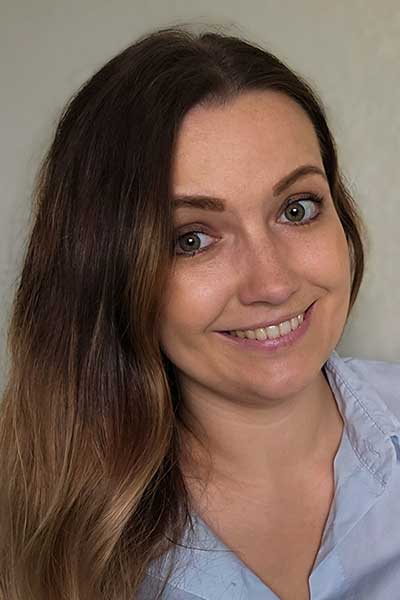Poster Presenter: Aleksandra Bylinska, MSc, PhD Candidate, Oklahoma Medical Research Foundation and University of Oklahoma Health Sciences Center

Poster Title: Single-cell Multi-Omic Evaluation of Differences in Immune Cell Populations in Progression Toward Systemic Lupus Erythematosus
Poster Session B: Monday, Nov. 13
What is your poster about?
“Differences in gene expression patterns in immune cell types, as well as involvement of metabolic pathways in disease progression. I’ve observed dysregulation of oxidative phosphorylation and autophagy-related pathways in monocyte and B cell populations during autoimmunity development trajectory. Involvement of antigen presentation pathways and altered expression of HLA-DM were also detected. I’m presenting a multiomic approach to dissect mechanisms driving preclinical autoimmunity development, using single-cell technology, including whole transcriptome gene expression, panel of 137-plex TotalSeq cell surface proteins, immunophenotyping by CyTOF (mass cytometry), and immune repertoire profiling.”
Why did you decide to investigate this topic?
“Autoantibody positivity and select autoimmune diseases are increasing in frequency, even before the global COVID-19 pandemic, and these numbers may increase even further with autoantibody production found in severe COVID patients. However, how autoantibody-positive patients remain with no or only minimal symptoms, while others transition to classified disease, is not well understood, as well as why incomplete lupus individuals with multiple criteria who have not reached the cutoff for lupus classification are not developing full spectrum of disease.
“Protective mechanisms in autoantibody-positive healthy individuals may provide important insights into the disease and potential therapeutic interventions for lupus patients. It is relevant to define molecular profiles characteristic for those groups of patients, as well as understanding the pathways that lead to lupus disease are critical to identify high-risk individuals for potential prevention trials or closer monitoring for early intervention before target organ damage.”
“Based on our system immunology approach, I plan to analyze multiple types of data that enable deeper understanding of different levels of gene regulation and study complexity of diseases such as lupus and further investigate functional responses that contribute to preclinical progression.”
— Aleksandra Bylinska, MSc
What are you working on next related to this research?
“Based on our system immunology approach, I plan to analyze multiple types of data that enable deeper understanding of different levels of gene regulation and study complexity of diseases such as lupus and further investigate functional responses that contribute to preclinical progression. I would like to characterize not only changes in phenotypes or gene expression levels, but also how immune cells are being regulated by investigating the epigenetic landscape of those cells. Additionally, I am trying to better understand variable, diversity, and joining (VDJ) repertoires in those individuals and define B/T cell expansion alongside with progression of preclinical autoimmunity, as well as potential HLA-A variations. I would also like to look at changes in levels of secreted soluble biomarkers and investigate receptor-ligand interactions. Further, I am going to identify genetic variants that might contribute to dysregulation of immune cell.”
What excites you most about your work?
“I am excited about the ability to use a system immunology approach, combine different types of datasets, and look at the broad perspective of my research problem, as well as clinical settings of the study, and being able to focus on translational impact of my research. I also am excited about being able to combine bioinformatics approaches with bench work.”
What are you most looking forward to at ACR Convergence 2023 in San Diego?
“I am looking forward to getting some feedback on my latest work and getting to know different points of view of my research problem to refine some of my ideas. I am also looking forward to interacting with other researchers and learning more about novel techniques and approaches in rheumatology.”

Registered ACR Convergence 2024 Participants:
Watch the Replay
Select ACR Convergence 2024 scientific sessions are available to registered participants for on-demand viewing through October 10, 2025. Log in to the meeting website to continue your ACR Convergence experience.
